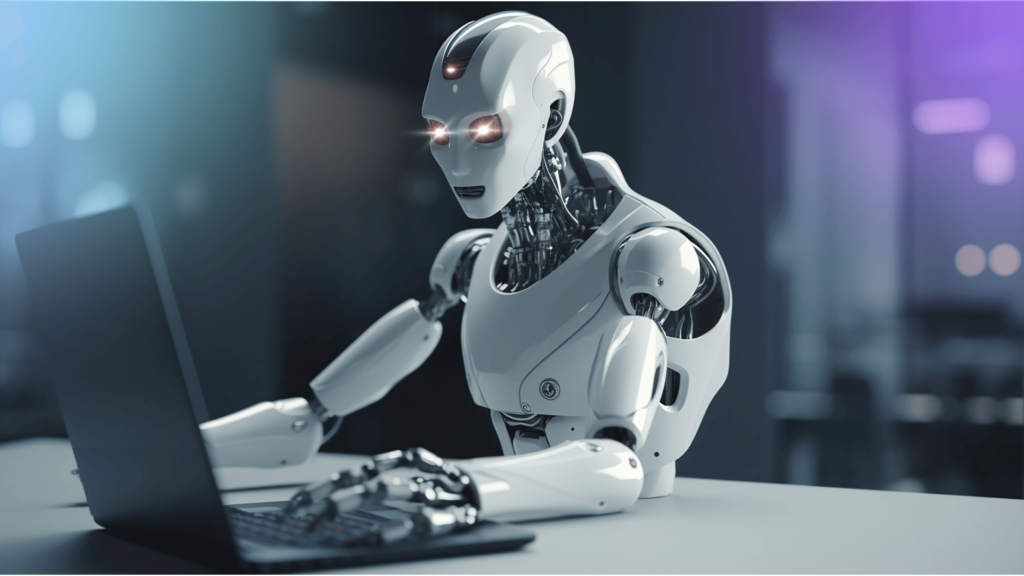
The robots are on the horizon, poised to revolutionize our world, but there’s no need to panic. By equipping yourself with the right knowledge and skills, you can position yourself to thrive in the age of automation. This article is your guide to navigating the AI revolution and ensuring you’re not left behind.
From understanding chatbots and machine learning to grasping the intricacies of artificial intelligence for students, we’ll cover it all. With this information at your fingertips, you’ll be the standout student, impressing educators with your grasp of the inevitable rise of AI. So, are you ready to embrace the future and delve into the world of artificial intelligence for students? Let’s embark on this journey together.
Artificial intelligence or AI is the field of computer science that attempts to build machines that can think and act intelligently, similar to a human. AI systems are powered by machine learning algorithms and neural networks which allow them to learn directly from data.
Machine learning is a method of data analysis that automatically builds the analytical model. It uses algorithms and statistical models to analyze and learn from patterns in huge amounts of data. The machine learns from the data, identifies patterns, and makes decisions with minimal human intervention. Some examples of machine learning include:
Neural networks are a type of machine learning algorithm inspired by the human brain. They are made up of interconnected nodes that operate like neurons firing and connections that operate like synapses. The neural network takes in massive amounts of data and learns on its own to detect complex patterns that humans may miss. Some examples of neural networks include:
AI and its components of machine learning and neural networks are powering exciting technological advances that will shape students’ futures. Understanding how these technologies work helps students develop an informed perspective on their possibilities and limitations. With knowledge and guidance, students can choose how these tools might enhance and support their learning, creativity, and collaboration.
Artificial Intelligence (AI) is transforming education in exciting ways. AI-powered software and tools are enhancing the learning experience for students around the world.
AI systems can analyze how students learn and provide a customized experience tailored to their needs. Adaptive learning platforms track how students interact with lessons and activities. They then adjust the content, pace, and sequence to match students’ progress and strengths. This personalized approach helps engage students and improves outcomes.
AI-based tutoring systems provide one-on-one guidance and support. They present interactive lessons and give students feedback and hints. Some systems even have natural language conversations, answering questions and discussing concepts. These virtual tutors free up teachers’ time so they can focus on students who need extra help. They also give students opportunities to practice and get assistance whenever they need it.
AI programs can evaluate and score assignments, tests, and essays. They analyze written responses for things like content, coherence, and proper language use. Automated grading systems are more efficient and consistent than human graders.
They also give teachers and students immediate feedback so they know what areas need improvement. Some schools are using automated grading to complement and double-check teachers’ scores.
Some AI education tools help students build career and life skills. For example, virtual simulations teach soft skills like communication, problem-solving, and conflict management. Other platforms offer micro-lessons and challenges to help students develop growth mindsets and resilience. These kinds of social-emotional learning opportunities will be crucial for students’ success in the future.
AI will continue advancing education through more intuitive interfaces, comprehensive data analysis, and sophisticated learning models. While human teachers are still essential, AI promises to enhance learning in ways that are engaging, personalized, and scalable. The future of education will blend the best of human and artificial intelligence.
AI is poised to transform education in exciting ways. As AI systems become smarter and more capable, they will take on an increasing role in the classroom. Teachers and students alike will benefit from AI’s help.
AI will enable truly personalized learning experiences tailored to each student’s needs, skills, and interests. Adaptive learning systems can adjust lessons and activities based on a student’s strengths and weaknesses. AI tutors and virtual reality simulations will provide customized guidance and hands-on learning.
AI will automate routine tasks like grading assignments, freeing up teachers to focus on more meaningful interactions with students. AI systems can quickly grade multiple-choice tests, essays, and short-answer responses. AI may eventually grade complex assignments, though human review will still be important, especially for younger students.
AI will provide data and insights to improve learning outcomes. By analyzing student data, attendance records, test scores, and more, AI can identify struggling students, spot trends, and propose interventions.
Predictive analytics may even help identify students at risk of dropping out. Teachers and schools can use these AI-powered analytics to strengthen curricula and better support students.
Of course, AI in education also presents challenges that must be addressed. There are valid concerns about student data privacy, bias in AI systems, and the impact of automation on teachers’ jobs. Close collaboration between researchers, policymakers, and educators will be needed to ensure AI is used responsibly and for the benefit of all students. With proactive management, AI can positively transform education rather than replace the human touch.
The future of education will be shaped by how we choose to apply and manage AI technology. Used constructively, AI in the classroom can open up new possibilities for customized, data-driven learning and unlock human potential at scale. But we must be vigilant, thoughtful, and inclusive at each step of integrating AI into education. With openness, oversight, and care, AI and human teachers can work together to enrich students’ learning in the decades to come.
To succeed in the future, students must develop skills that artificial intelligence can’t easily replicate. While AI will handle many routine cognitive tasks, uniquely human skills like creativity, emotional intelligence, and complex problem-solving will be increasingly valuable.
Develop strong communication, collaboration, and critical thinking skills. Work with people from all walks of life. These “soft skills” will be crucial for future jobs, as AI takes over routine tasks.
With technology rapidly changing fields, ongoing learning will be essential. Develop a habit of constant reading, taking online courses, and expanding your knowledge. Learn how to quickly pick up new skills that may be required for jobs that don’t even exist yet. Staying up-to-date with advances in your areas of interest will ensure you have relevant, in-demand knowledge and skills.
While soft skills are essential, technical skills will also be important for many future careers. Take courses in programming, data analysis, robotics, or other fields where AI is advancing rapidly. Even if you don’t pursue a career in these areas, developing a basic understanding of AI and new technologies will help you work with them more effectively.
Unlike AI, humans are good at solving messy, open-ended problems with no clear solution. Look for opportunities to solve complex real-world problems through school projects, internships, or volunteering. Develop skills in gathering data, identifying issues, and evaluating possible solutions. These skills will serve you well in a world where AI handles routine cognitive tasks.
With continuous learning, strong soft skills, technical knowledge, and practice solving complex problems, students can develop skills that will be highly valuable in an AI-powered world. While AI may transform the job market, people who cultivate skills that machines can’t easily replicate will be poised for success.
AI will significantly impact students in several ways:
AI-based learning systems can personalize instruction to individual students. They can adapt the pace, content, and style of instruction to best suit each student’s needs. These systems also provide instant feedback and guidance as students work through assignments and practice exercises.
AI will enhance career guidance and planning. AI-powered systems can analyze a student’s skills, interests, values, and goals to provide personalized career recommendations and paths to achieve them. They can also project the job market of the future to help students choose careers that will be in high demand.
AI will improve accessibility. AI has the potential to make education more accessible to students with disabilities through applications like automatic speech recognition, text-to-speech, and visual recognition. These technologies can help translate auditory information into text and vice versa.
AI-based tutoring systems and virtual assistants can provide on-demand help. They can answer questions, explain concepts, give feedback on assignments, and guide students through complex topics anytime they need it.
AI will transform assessment. AI can analyze students’ writing, work samples, and test scores to provide teachers with a more well-rounded view of students’ abilities and potential. AI-based assessment may eventually replace high-stakes testing.
While AI will significantly impact education, human teachers will remain essential. Their knowledge, social-emotional skills, and ability to motivate students are impossible to replicate in AI. Teachers and AI will work together to enhance learning in a way that benefits students.
So while Artificial Intelligence for students may seem intimidating, the truth is, that it’s going to open up a world of new opportunities for you as a student. Embrace it as a tool to help you learn better and achieve more. The future is yours to shape—so get out there and start preparing yourself for the AI-powered world ahead.
With the right mindset and skills, you’ll be more than ready to thrive in this exciting new era. Just remember to keep an open and curious mind. The possibilities are endless when human creativity pairs up with artificial intelligence.
Artificial Intelligence or AI refers to computer systems designed to perform human-like tasks such as learning, planning, reasoning, problem-solving, perception, and even creativity. AI has advanced rapidly in recent years and is transforming many areas of society.
Teaching students about AI is essential because it develops their digital literacy, critical thinking skills, and prepares them for future academic and career success. Understanding AI systems enables students to engage with AI technologies safely, responsibly, and ethically.
AI learning benefits students by fostering creativity, problem-solving abilities, and adaptability. It equips them with skills relevant to the modern workforce, where AI is increasingly integrated into various fields.

Owen is a tech enthusiast and blogger who loves to explore the latest trends and innovations in the world of technology. He writes about topics such as artificial intelligence, blockchain, cybersecurity, and more. He enjoys sharing his insights and opinions with his readers and engaging with them in lively discussions. When he is not writing, he likes to play video games, watch sci-fi movies, and travel to new places.